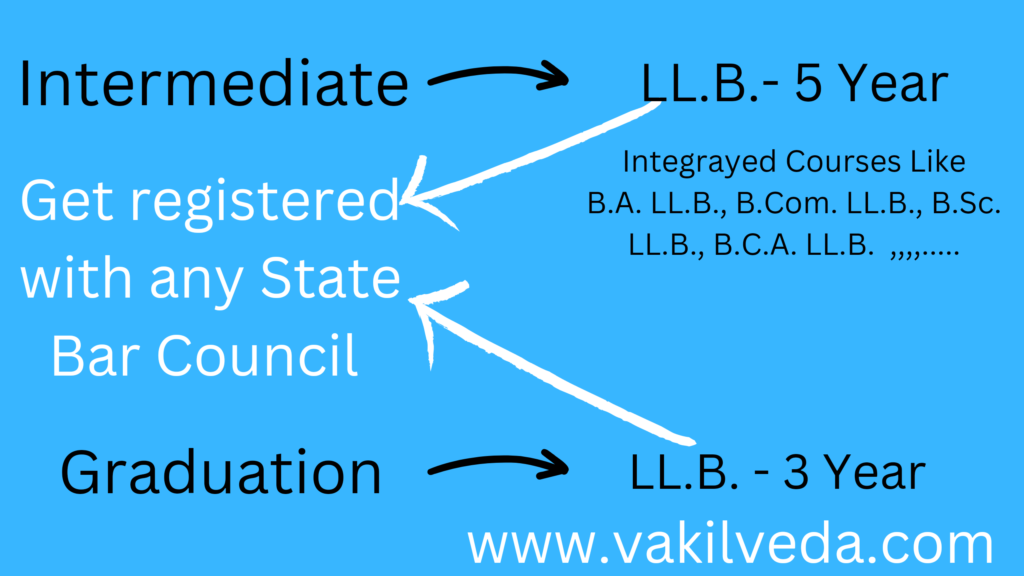
After passing out LL.B. every law graduate thinks that how to get Registered as an Advocate? For getting registered as an Advocate the law graduate will have to fill out the application form issued by the respective State Bar Council. The respective State Bar Councils have been authorized by Section 17 of the Advocate Act, 1961 to prepare and maintain a roll of Advocates.
Who is an Advocate-
An Advocate is a person who is recognized/authorized by the Law to argue for the cause/issue of another person, especially before a Court of Law. Section 2(1)(a) of the Advocate Act, 1961 defines the term Advocate as an “Advocate” means an Advocate entered in any roll under the provisions of this Act. An Advocate is the only person who is authorized by the Advocate Act to practice legal profession before a Court of Law.
Educational Qualification for becoming an Advocate-
For Advocate registration, there is a specific qualification that one must qualify otherwise one will not be eligible to become an Advocate. For becoming an Advocate the person must be a law graduate. By law graduate, it meant that he/she must have passed the LL.B. examination. For becoming a law graduate there are two courses. One is LL.B. (Three Year) course and another is LL.B. (Five Year) course. The details are as follows:
LL.B. Three year Course-
This course is for those who have passed graduation. Although, if anyone is postgraduate or has any other equivalent qualification then that one is also eligible to do this course. There is no age limit to pursue this course. This course can be pursued from any Central University, State University, Deemed University, or any college having affiliation with any recognized University in India. The University or college must be recognized for the purposes of this Act by the Bar Council of India.
LL.B. Five Year Course-
The LL.B. five-year course is for those who have passed the intermediate examination. Passing Intermediate is necessary, Those who have passed high school shall be underqualified for doing this course. Initially, there were age limits for doing this course then later on it was removed by the Judgment of the Hon’ble Supreme Court. This course can be pursued from any National Law University (Admission through CLAT Examination), Central University, State University, Deemed University, or any college having affiliation with any of the recognized Universities in India. The University or college must be recognized for the purposes of this Act by the Bar Council of India.
If he/she has qualified degree from any University outside the territory of India if the degree is recognized for the purposes of this Act by the Bar Council of India.

Other qualifications (Section 24, Advocate Act, 1961)-
- Citizenship – He should be a citizen of India. Although, subject to the other provisions contained in this Act, a national of any other country may be admitted as an advocate on a State roll. But there is a condition that if citizens of India, duly qualified, are permitted to practice law in that other country.
- Age – The person intending to get registered must have completed the age of twenty-one years.
- He/she fulfills such other conditions as may be specified in the rules made by the State Bar Council under this Chapter;
Who Registers as Advocates-
The State Bar Councils have been authorized by the Advocate Act, 1961 to register any person as an Advocate. But that person must be qualified to become an Advocate as per section 24 of the Advocate Act, 1961. Section 17 of the Advocate Act clearly states that every State Bar Council shall prepare and maintain a roll of Advocates in which, shall be entered the names and addresses of all persons who are admitted to be Advocates.
How to get registered with a State Bar Council-
There are different registration forms for different State Bar Councils. Each having different registration fee as prescribed by the concerned State Bar Council. Application form/ their links are as follows:
Advocare Registration Application form of Bar Council of Uttar Pradesh-
The application form can also be downloaded with the Link.
Advocate Registration Application form of Bar Council of Jharkhand-
The application form can also be downloaded with the Link.
Advocate Registration Application form of Bar Council of Gujrat-
The application form can also be downloaded with the Link.
Advocate Registration Appliation form of Bar Council of Kerala-
The application form will have to be filled online on the Link.
After getting registered as an Advocate the respective State Bar Council issues Enrolement Number (*****/Year). The enrolement number will also be printed on the Identity Card issued by the respective State Bar Council and also on the certificate issued by the respective State Bar Council. The Advocate must memorize the enrolement number because it is going to be used in every Vakalatnama you file. Enrolement No. will also be mentioned in the CoP (Certificate of Practice) and Identity Card issued after passing the AIBE (All India Bar Examination) .



Pingback: Transfer of Advocate’s Membership From Roll of One State Bar to Another- - VAKILVEDA